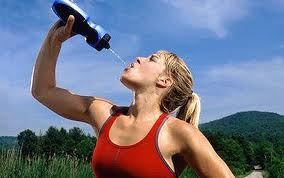Diets
- AIDS Diet
- Athletes's Diet
- Atkins Diet
- Bodybuilding Diet
- Breast Feeding Diet
- Cabbage Soup
- Cancer Patient's Diet
- Cardiac Patient's Diet
- Pediatric Diet
- Diabetes Diet
- Diet Plan
- Diet Programs
- Fitness Diet
- Cardiac Patients
- Kidney Disease Diet
- Low Calorie Diet
- Hypertension Diet
- Pregnancy Diet
- High Protein Diet
- Sports Diet
- Vegetarians Diet
- Weight Gain
- Fasting Diet
- Calorie Diets
- Celebrity Workout
- Diet for Gout
- Herbal Diets
- Zone Diet
- Herbal Phentermine
- South Beach Diet
- High Fiber
- Low Carb Diets
- Low Carb Dieting
- Low Carb Dieter Eat
- Atkins Low Carb Diet
- Atkins Low Carb Diet Program
- Monounsaturated Fats
- Food Choices Low Carb Meals
- Shopping Right Supplements
- Top 3 questions for Low Carb Dieting
- Better Food Choices
- Fluorosis
- Wu Yi Tea
- Ultra Lean Green Tea
- Acai Berry Power 500
Diet for Athletes: The Sports Diet
The keys to physical fitness are exercise, motivation, and good nutrition. Optimal nutrition is a basic training component necessary for the development and maintenance of top physical performance. The principles of sound nutrition apply to everyone, but can give the athlete the competitive edge.

The energy cost of a particular sport depends on the intensity demanded of the physical activity, the length of time for intense exertion, and the total participation time. Almost any moderate sport can become one of high energy need if it is carried on for a long period of time.
Just as an automobile will run best with a full tank of the proper fuel, the body will perform at its maximum capability when filled with the right nutritional fuel. For athletes, that fuel is complex carbohydrates (starches) and is found in foods such as cereal, pasta, breads, and baked potatoes.
During digestion, the complex carbohydrates are broken down into glucose, an important energy source used by the muscles during exercise. Glucose may be used immediately or stored in the liver and muscles as glycogen. The greater the stores, the longer the body can delay the onset of exhaustion-- the point at which the body "runs out of gas" and fatigue sets in. Athletes who fail to keep themselves nutritionally fueled may lack the energy to maintain peak performance.
The best way to prepare the body for practice and competition is to build and maintain muscle glycogen levels, by eating foods high in complex carbohydrates. The high carbohydrate diet is the best choice for supplying energy and prolonged endurance.
Body fat is essentially stored energy. In order for fats to be efficiently used as fuel, they need to be metabolized in the presence of oxygen. This makes them less efficient than glycogen (a more readily available energy source) and at less of an energy expense to the body. Excess fat also represents extra weight that an athlete must carry during practice and competition.
Importance of Fluids in Athlete's Diet

Nearly two thirds of the human body is water, which provides the aqueous environment needed for all essential biochemical processes. Of all the nutrients essential to good athletic performance, water is perhaps the most critical, and least appreciated.
Experts agree that fluid replacement is important not only after but before and during a workout. The body needs to maintain water balance as a part of homeostasis. Water is essential to regulate body temperature, maintain proper circulation, maintain salt and electrolyte balance, and to remove wastes through urine production.
Exercising muscles generate an increased amount of heat that must be eliminated from the body. Water acts as a coolant to working muscles by evaporating through the skin as sweat. This cools the skin and the blood circulating near the skin surface. Inadequate cooling can result in heat exhaustion, or a more serious illness, heat stroke.
Unfortunately, thirst is not among the early symptoms of dehydration. It is possible to lose up to 2 quarts of water before becoming noticeably thirsty. Thirst is also quenched before body fluids are fully replaced. Most people stop feeling thirsty when they have drunk only about two thirds of the fluid they have lost.
It is important to prepare for endurance events by compensating for fluid losses Before, During, and After the workout. The following are some guidelines that are recommended by the American Dietetic Association and the American College of Sports Medicine:
Before
- drink at least eight 8 ounce glasses of fluids the day before
- drink 16 to 20 ounces of fluids about 2 hours before exercising
- drink 6 to 16 ounces of fluid 15 to 30 minutes before a workout
During
- drink 3 to 7 ounces of fluid every 15 to 20 minutes during a workout
After
- drink 16 ounces of fluid for each pound lost (routinely check weigh before and after workout)
Although athletes involved in endurance sports can benefit from special sports drinks that contain calories and sometimes electrolytes (sodium and potassium), simple fluid replacement is the goal for the recreational athlete. Carbohydrate and protein supplemented sports drinks are most useful immediately after a workout.
Plain water, iced tea, sugar-free sodas, and fruit and vegetable juices are all appropriate choices. In general, cool drinks are absorbed more quickly than warm or room temperature drinks. In addition, cool drinks are recommended during warm weather because they can help lower body temperature.
Although sugar is often thought of as a quick source of energy, heavily sugared beverages and juices are ill advised in the final hour BEFORE exercise. Sugar stimulates the release of insulin from the pancreas which slows the release of glucose from the liver, the form of energy needed by the working muscles. Insulin's job is to speed the removal of glucose from the blood. Hence, if an athlete drinks a heavily sugared beverage, and then begins to exercise strenuously, glucose is removed too quickly and the blood sugar level drops sharply. Muscles are deprived of the fuel they need most, and the athlete experiences fatigue.
Importance of Carbohydrate in Athlete's Diet
Carbohydrates are the primary fuel for exercise. The athlete's extra caloric needs are best met through increasing the amount of complex carbohydrates in the diet. At least 55% of the athlete's calories should come from carbohydrate sources. After digestion, carbohydrates are stored in the liver and muscles as glycogen. The amount stored equals about 1,800 calories for a 150 pound male; the trained, conditioned, and well nourished athlete will store more.
Under conditions of short term, high intensity exercise, carbohydrate is used almost exclusively as the fuel source. During prolonged exercise the greatest utilization of carbohydrates occur during the first 4 to 5 minutes. As exercise continues, the fuel source shifts to a progressively greater amount of fat.
Carbohydrate is stored in limited quantities; this limits our ability to perform endurance exercise. Endurance events, such as running or cross country skiing lasting 60 minutes or more, can deplete the stored glycogen. Replenishing carbohydrates (carbohydrate containing fluids) during and after endurance activities is recommended to increase performance.
